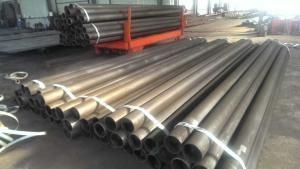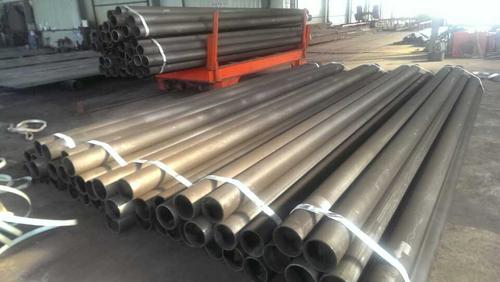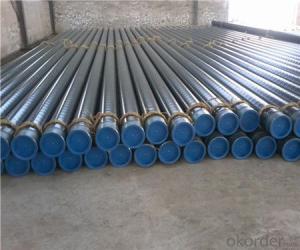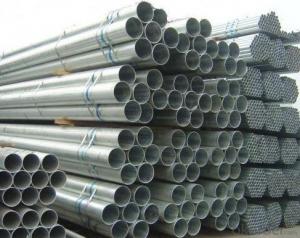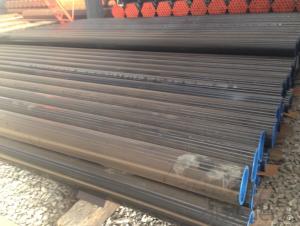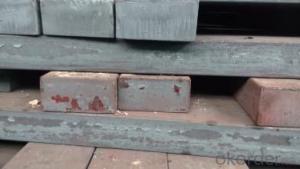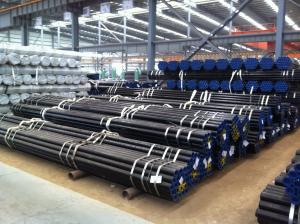Hot Rolled API 5L Seamless Tube
- Loading Port:
- Tianjin
- Payment Terms:
- TT OR LC
- Min Order Qty:
- -
- Supply Capability:
- 20000ton m.t./month
OKorder Service Pledge
OKorder Financial Service
You Might Also Like
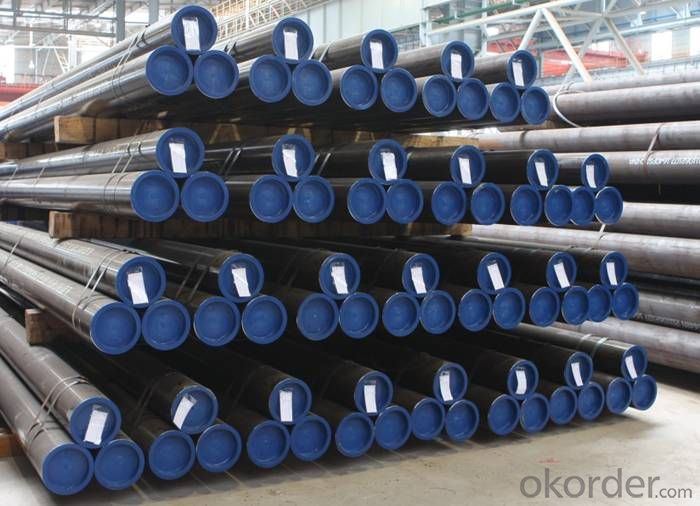
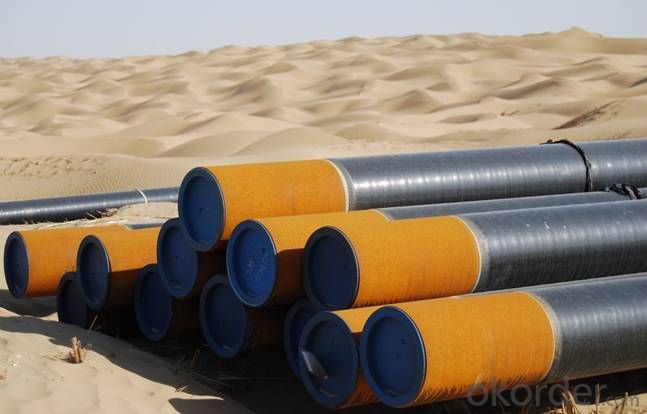
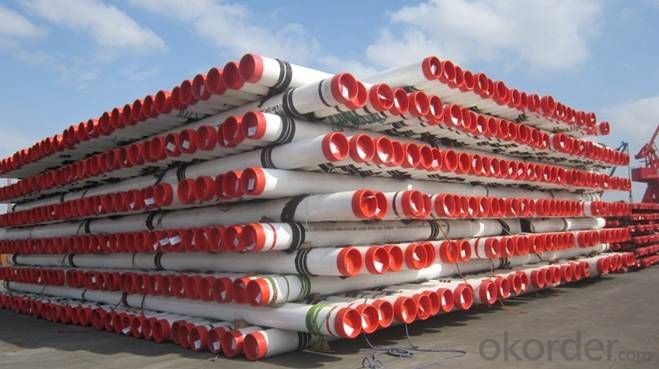
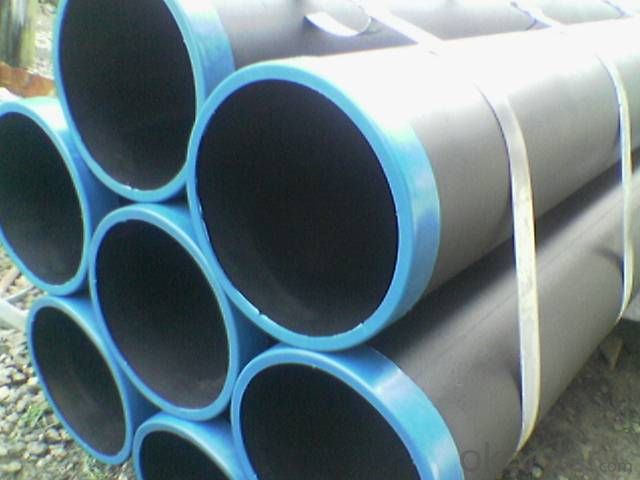
Product Descriptions :Hot Rolled API 5L Seamless Tube
The Hot Rolled Seamless Tube is manufactured through automatic continuous tube rolling mills.Precisely temperature (recrystallization temperature) controlling is required during different rolling processes,like initial rolling stage,finish rolling stage and curling stage,to achieve microstructure and mechanical structure of steel plates,Thus,they can be deformed to a large extend
Our mill could produce hot rolled seamless tube in ASTM,EN,GB,BS,DIN,GOST,JIS standard,it is our great honor to pass API,CE,ISO,CCS certificate,it proves that our goods are meet the high quality,this make us has obtained a great huge number of customers from abroad.
1. Executive standards:
ASTM A106,ASTM A53,API 5L,EN10216,EN10217,EN10219,EN10210,BS3601,BS3087,DIN1626,DIN1629,DIN17175,GOST 8732,GOST 8734 and so on
2. Specification range
OD: 1/8"-36"(219mm,325mm,406mm,508mm,457mm,558mm, 609mm,914mm,660mm,711mm,762mm is our advantages)
WT: SCH10-SCHXXS
3.Materials:
A53B,A106B,API5LGR.B,X42,X46,X52,X56,P195TR1,P235TR1,P265TR1,P195TR2,P235TR2,P265TR2,P245,P195GH,
L290,L360,P235GH,P265GH,S275JRH,S275J2H, S355J2H,ST35.8,ST45,ST45.8,ST44.2,ST44.3,ST52.3 and so on
4. Testing: We accept any test as your required
5. Packing of hot rolled seamless tube: Bundles,black painted,capped ends
WEIGHT per Kg. / Mtr.
ASTM PIPE SCHEDULE: Wall Thickness in MM, Wt = Weight in Kg. / Mtr.
| Nominal | Pipe size | OD mm | Schedule STD | Schedule 40 | ||
| Mm | Inch | Wall | Wt. | Wall | Wt. | |
| 3 | 1/8 | 10.3 | 1.73 | 0.37 | 1.73 | 0.357 |
| 6 | ¼ | 13.7 | 2.24 | 0.63 | 2.24 | 0.625 |
| 10 | 3/8 | 17.1 | 2.31 | 0.84 | 2.31 | 0.84 |
| 15 | ½ | 21.3 | 2.77 | 1.26 | 2.77 | 1.26 |
| 20 | ¾ | 26.7 | 2.87 | 1.69 | 2.87 | 1.68 |
| 25 | 1 | 33.4 | 3.38 | 2.5 | 3.38 | 2.5 |
| 32 | 1 1/4 | 42.2 | 3.56 | 3.39 | 3.56 | 3.38 |
| 40 | 1 1/2 | 48.3 | 3.68 | 4.05 | 3.68 | 4.05 |
| 50 | 2 | 60.3 | 3.9 | 5.44 | 3.9 | 5.44 |
| 65 | 2 1/2 | 73 | 5.2 | 8.63 | 5.16 | 8.63 |
| 80 | 3 | 88.9 | 5.5 | 11.3 | 5.5 | 11.3 |
| 90 | 31/2 | 1.6 | 5.74 | 13.57 | 5.74 | 13.57 |
| 100 | 4 | 114.3 | 6.02 | 16.07 | 6.02 | 16.07 |
| 125 | 5 | 141.3 | 6.6 | 21.77 | 6.55 | 21.77 |
| 150 | 6 | 168.3 | 7.11 | 28.26 | 7.11 | 28.26 |
| 200 | 8 | 219.1 | 8.2 | 42.5 | 8.2 | 42.5 |
| 250 | 10 | 273 | 9.27 | 60.3 | 9.27 | 60.3 |
| 300 | 12 | 323.9 | 9.53 | 73.8 | 10.3 | 79.7 |
| 350 | 14 | 355.6 | 9.53 | 81.3 | 11.13 | 94.3 |
| 400 | 16 | 406.4 | 9.53 | 93.3 | 12.7 | 123 |
| 450 | 18 | 457.2 | 9.53 | 105 | 14.3 | 156 |
| 500 | 20 | 508 | 9.53 | 177.2 | 15.1 | 183 |
| 550 | 22 | 558.8 | 9.53 | 129 | ||
| 600 | 24 | 609.6 | 9.53 | 141 | 17.4 | 255 |
- Q: How are steel pipes used in the construction of railways?
- Steel pipes are commonly used in the construction of railways for various purposes. They are primarily used in the fabrication of track structures, such as track supports, bridge components, and culverts. Steel pipes provide strength, durability, and resistance to external factors like corrosion and extreme weather conditions. They are also used for the transportation of fluids, such as water or fuel, within the railway infrastructure, ensuring efficient operation and maintenance of the system.
- Q: What are the different shapes available for steel pipes?
- There are several different shapes available for steel pipes, including round, square, rectangular, and oval.
- Q: What are the advantages of using steel pipes in the manufacturing of storage tanks?
- There are several advantages of using steel pipes in the manufacturing of storage tanks. Firstly, steel pipes are highly durable and have a long lifespan, making them capable of withstanding high pressure and harsh environmental conditions. Secondly, steel pipes offer excellent resistance to corrosion, ensuring the integrity of the storage tank and preventing any leakage or contamination. Additionally, steel pipes are flexible and can be easily fabricated into various shapes and sizes, allowing for customization based on specific storage requirements. Lastly, steel pipes are cost-effective and readily available, making them a popular choice in the manufacturing industry.
- Q: What is the size of seamless steel tube DN150?
- Seamless steel tube is generally used to indicate the outer diameter * wall thickness, DN150 seamless steel pipe GB wall thickness is 5mm. Wall thickness is a series of calculations based on your design, pressure, temperature, and pipe material.
- Q: Can steel pipes be used for transportation of hazardous materials?
- The transportation of hazardous materials can indeed utilize steel pipes. Steel is renowned for its robustness, longevity, and resistance to rust, which renders it suitable for the management and conveyance of various perilous substances. This encompasses combustible liquids, noxious chemicals, and other hazardous materials. Steel pipes, employed for the transportation of hazardous materials, are frequently custom-designed and fabricated to comply with strict safety regulations and industry standards. They are typically forged from top-notch steel alloys and subjected to stringent tests to guarantee their integrity and resistance to leaks or ruptures. Additionally, steel pipes can be manufactured with supplementary protective coatings or linings to furnish an extra layer of security and avert any potential reactions between the hazardous substance and the steel. These coatings can also aid in reducing the risk of corrosion and prolonging the lifespan of the pipes. In summary, steel pipes have an established record in the transportation of hazardous materials due to their inherent strength, durability, and ability to withstand the challenging conditions frequently encountered during transportation. Nonetheless, it is imperative to adhere to proper protocols for handling, storage, and transportation to ensure the safety of both the transported materials and the individuals involved in the process.
- Q: Can steel pipes be used for electrical conduits?
- No, steel pipes are not typically used for electrical conduits as they are conductive and can pose a safety risk. Electrical conduits are usually made of non-conductive materials such as PVC or metal with insulating coatings.
- Q: Hot galvanized steel pipe for use?
- Hot galvanized pipe: in order to improve the corrosion resistance of steel pipe, galvanized steel pipe. Galvanized steel pipe hot galvanized and galvanized two kinds, hot galvanized, zinc coating thickness, zinc plating cost is low, the surface is not very smooth.The hot-dip galvanized pipe is an alloy layer that causes molten metal to react with the iron matrix, thus combining the substrate with the two coating. Hot dip galvanizing is the first steel pickling, in order to remove iron, steel pipe surface after pickling, cleaning by ammonium chloride or zinc chloride solution or ammonium chloride and zinc chloride aqueous solution tank, and then into the hot dip tank. Hot galvanizing has the advantages of uniform coating, strong adhesion, long service life and so on. A complex physical and chemical reaction is formed between the steel tube matrix and the molten plating solution to form a corrosion resistant structure with a tight zinc - iron alloy layer. The alloy layer is integrated with the pure zinc layer and the steel pipe matrix. Therefore, it has strong corrosion resistance.
- Q: What are the different types of steel pipe unions?
- Various industries and applications commonly utilize several types of steel pipe unions. Some of the most frequently used types are as follows: 1. Threaded Union: This union features female threads on both ends, facilitating easy attachment to two male threaded pipes. It ensures a reliable connection that is resistant to leaks. 2. Socket Weld Union: On one end, this union has a socket, while the other end is equipped with a female threaded connection. It is specifically designed for socket welding, where the pipe is inserted into the socket and then welded around the joint, resulting in a robust and long-lasting connection. 3. Butt Weld Union: This specific union is employed for joining two pipes with butt weld ends. It necessitates beveling the pipes and subsequently welding them together, creating a sturdy and permanent connection. 4. Compression Union: Typically used for connecting pipes made of softer materials like copper or plastic, compression unions consist of a compression nut and a compression ring. These components are tightened onto the pipe, ensuring a tight and secure seal. 5. Flanged Union: This union is equipped with flanges on both ends, allowing it to be bolted onto two flanged pipes. Flanged unions are commonly utilized in applications where easy disassembly and reassembly are necessary. 6. Grooved Union: Grooved unions possess grooves on their ends, which are utilized for connecting pipes by inserting them into the grooves and securing them with a coupling. They are often utilized in fire protection systems and other applications where quick installation and easy maintenance are of utmost importance. These examples represent only a fraction of the numerous types of steel pipe unions available. The selection of a union depends on the specific requirements of the application, such as the pipe material, size, and operating conditions. Seeking advice from a professional or consulting industry standards can aid in determining the most suitable union for a particular project.
- Q: Can steel pipes be used for power plant construction?
- Yes, steel pipes can be used for power plant construction. Steel pipes are commonly used in power plants for various applications such as steam piping, water piping, and air/gas piping. They are preferred due to their strength, durability, and ability to withstand high temperatures and pressures. Steel pipes also have excellent corrosion resistance properties, which is crucial in power plant environments where different fluids and gases are transported. Additionally, steel pipes can be easily welded, allowing for efficient installation and maintenance. Overall, steel pipes are a reliable and cost-effective choice for power plant construction.
- Q: Can steel pipes be used for underground water wells?
- Yes, steel pipes can be used for underground water wells. Steel pipes are commonly used for drilling water wells due to their durability, strength, and resistance to corrosion. However, it is important to ensure that the steel pipes are properly coated and protected to prevent any contamination of the underground water source.
Send your message to us
Hot Rolled API 5L Seamless Tube
- Loading Port:
- Tianjin
- Payment Terms:
- TT OR LC
- Min Order Qty:
- -
- Supply Capability:
- 20000ton m.t./month
OKorder Service Pledge
OKorder Financial Service
Similar products
Hot products
Hot Searches
Related keywords
